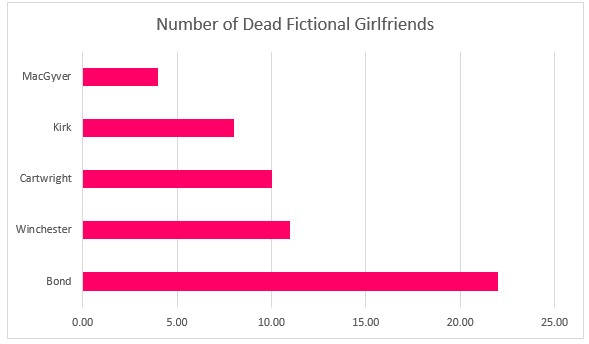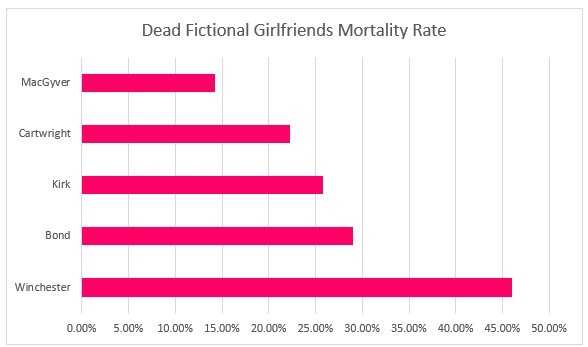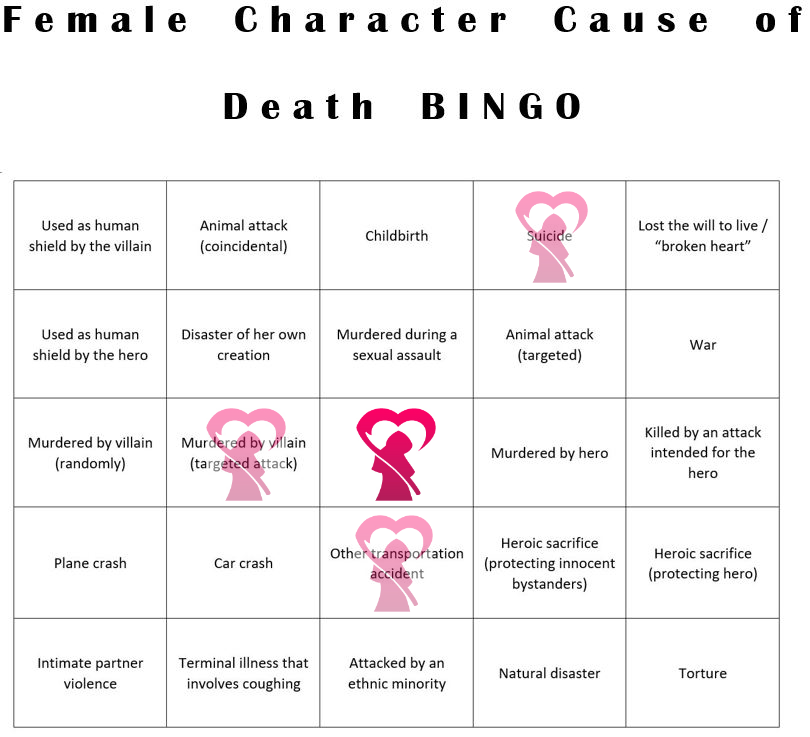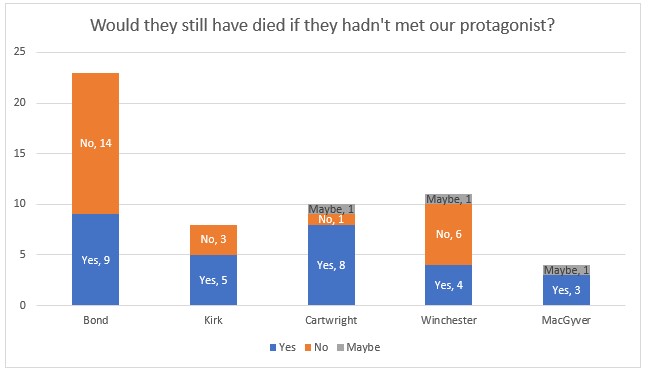MacGyver: How to Kill A Girlfriend with a Hairpin and a Piece of Duct Tape
October 25, 2022
Wait, they only hired 1 woman in season 3 and just had her play all the roles? That's something that a parody of a TV show should do!
- My husband, after reading about Elyssa Davalos in my last MacGyver post
Welcome, dear readers, to Part II of my MacGyver analysis, in which we will finally learn how many women MacGyver narrowly saves using hastily improvised contraptions...and of course, how many girlfriends he fails to save. Let us begin with a few words on...
The Character
Carol Varnay: Do something.
MacGyver: What?
Carol: You're the one who picked the embassy lock with a lightbulb filament and ground-up pencil lead. You're also the one who shorted an alarm system with a chewing gum wrapper and a half a lemon. Come ON!
- "For Love Or Money" (1987-05-04)
MacGyver has a heart of gold, a lot of random knowledge, and strong improvisational skills. He is, in fact, a man after my own heart, and I choose to believe that he'd be a DFGRR reader if he were real.
MacGyver was invented by screenwriter Lee David Zlotoff, when he was very stuck on a pilot deal, after being told, "Go with nothing. Your guy . . . he’s got nothing." In other words, what if an action hero had to go into bad situations without any trademark weapons, or distinctive outfits, or trusty teammates, and yet he always managed to save the day? From that conversation, MacGyver emerged, and he went on to save 139 episodes plus 2 TV movies' worth of days.
The bag's not for what I take, it's for what I find along the way.
- Mac defends his empty knapsack, "Pilot" (1985-09-25)
MacGyver was envisioned as something different from the average action-adventure show, and the title character as someone different from the average 80s action star. To bring this vision to life, producers John Rich and Henry Winkler cast erstwhile soap-opera actor Richard Dean Anderson (hereinafter RDA), reportedly because he was "vulnerable" and brought some "humanity" to the part. Reinforcing the "he's got nothing" theme, RDA was initially the only series regular. Partway through season 1 he was joined by his occasional boss and best friend, Pete Thornton (Dana Elcar), and the two of them remained alone in the opening credits for the rest of the run. And yet somehow the opening credits make up 3% of the average episode's runtime.
Naturally, such a sparsely-populated cast list didn't have any room for Mac to get a steady girlfriend. It didn't stop the women from trying, though, as we will see below.
Mac: I call it an obstacle course. Some of the others call it MacGyverland.
Pete: MacGyverland, eh? How did Bill Foy do here?
Mac: Well actually, this is where he broke his leg.
- Exploring Mac's idea of fun, "The Survivors" (1989-01-09)
Everybody grab the nearest conglomeration of random objects you could use to make a splint, and let's take a walk into MacGyverland.
MacGyvering In Search of a Better World...Maybe?
As I've highlighted in our previous discussions of both Star Trek and Bonanza, some network TV shows want to change the world by discussing Important Issues on primetime TV. As I mentioned in the contestant introduction post, MacGyver falls into that category. This show wanted you to be aware of things - things like acid rain, endangered species, child abuse, white supremacy, etc. It was probably hoping we'd do something to fix those things, but we haven't quite managed that much, in many cases. Nevertheless, it gets full points for trying.
Sadly, it has strange, consistent blind spots about what constitutes a better world. Case in point: MacGyver cares a tiny little bit about "women's issues," such as sex trafficking, custodial kidnapping, intimate partner violence, and...*stares at notes* oh, no, wait, that was all of them. Now, I don't mean to diss those 3 extremely serious issues, but it does seem like 80s feminists had plenty other things they wanted the world to talk about, like equal pay, sexual harassment, maternity leave, etc. And even though MacGyver is shown working alongside female agents at the Phoenix Foundation, the show was Not Interested in any of those.
OK, well, at least we can award 3 points for MacGyver on the "mentioning women's issues" front, right?
Not So Fast!
Hold up a minute - we need deduct a point on the intimate partner violence thing. See, it is most prominently featured in "Jerico Games," in which Mac's high school sweetheart, Ellen Stewart, shows him bruises inflicted by her jealous husband. In a shocking twist, it turns out Ellen faked those bruises with her makeup-artist skills...as part of a complicated attempt to frame MacGyver for murdering her husband...as revenge for MacGyver breaking up with her...twenty years previously.

Whoo boy. Now, class, repeat after me: it is not OK to suggest that abuse victims are conniving liars with homicidal intent. It is not OK to suggest that abuse victims are conniving liars - you get the picture. This is not OK. Point revoked.
To give credit where it's due, the MacGyver writers did much better research into sex trafficking & custodial kidnappings, and put out two perfectly respectable, nuanced episodes on those subjects ("Runners" and "The Battle of Tommy Giordano," respectively). But two out of three is, in fact, bad when you're talking about only mentioning 3 gender-based issues across your 7-season run, and completely bungling a third of them.
I first watched MacGyver as a preteen and did not realize until 15 years later how gross and misogynistic it sometimes is. Sadly, though, this show contains sexism. Whether it was intentionally put there to appeal to sexist viewers, or is simply a byproduct of being created in a misogynistic world, is certainly worth considering as we dive into this show.
You're a closet sexist.
- Nikki Carpenter calls Mac out, "GX-1" (1987-11-02)
With that context in mind, this blog is about dead girlfriends, so let's talk about the ladies who die in this show.
Methodology
MacGyver came into my life the same way our previous contestants Bonanza and Star Trek did: it was frequently rerun on cable in the early Aughts, when I was a middle schooler with quite a record of sick days. In fact, I first encountered this show while taking steroids, antibiotics, and codeine cough syrup. I was so spaced out that it took me 4 episodes to realize that the wacky contraptions he builds were the point of the show. Up till then, I had assumed it was just a show about RDA being nice to people.
To refresh my memory for this study, I subscribed to Paramount+ (formerly CBS All Access) and watched 7 seasons' worth of MacGyver. Then I got the box set from my library to watch the TV movies, which were both terrible. I finished the whole binge in about a year and a half. So let's move on to...
The Stats
Across 105 hours of screentime, MacGyver dates 28 women. One of them is Penny Parker (Teri Hatcher), who is also a Bond girl in Tomorrow Never Dies, and who therefore becomes our first multi-franchise data point. She survives, and also keeps her sanity, so good for her.
What was that about her sanity?
Ah, see, two of MacGyver's girlfriends end up in mental hospitals at the end of their episodes: the aforementioned homicidally insane Ellen from "Jerico Games," and Carla from "Two Times Trouble," who has developed a split personality following the traumatic death of her twin sister. Those aren't the only two girlfriends to lose it on MacGyver, but only they specifically get institutionalized as a result. Mac, being an all-around decent guy, ends "Two Times Trouble" by visiting Carla and complying with her request to see his beautiful smile.
via GIPHY (GIF description: MacGyver smiling.)
So that makes Mac our First Contestant to Visit A Girlfriend in a Psych Ward, which is something.
Mortality Rate
Of the 28 women Mac sees, 4 of them die and 3 fake their deaths. For our purposes, I'm going to stick with only the really-dead ones. That gives him an actual mortality rate of 14.29%, which makes him our lowest-scoring contestant so far by both numbers and percentage:


Still, it's a respectably high number of girlfriends for a man who also stays single for the entire run of the show.
Causes of Death
The 4 deaths are:
- 2 assassinations by communists (the Soviet KGB in Season 3 and China's PLA in Season 7);
- 1 mountain-climbing accident (Season 3); and
- 1 fall off a cliff, which happens because Mac offers her his hand to save herself, but she stabs him instead (Season 4).
This relatively uneventful list means that Mac is definitely not competitive in the world of Female Cause of Death BINGO.

On the other hand, in the category of "How many of these women would've died even if they hadn't met you," MacGyver does surprisingly well. Three of the dead girlfriends had extremely high-risk lifestyles. One was a KGB agent who tried to double-cross the KGB, which is a sure way to get shot. Another was a photojournalist trying to expose crimes against humanity inside the People's Republic of China, which is also a great way to get shot. And a third was a corporate spy who specialized in stalking men and infiltrating their lives so as to get them to kill deals that threaten her employers’ business. After a prison sentence for trying to do that to Mac, she comes after him again. By the time she's dangling off a cliff and stabbing at his helping hand, it's fairly obvious that she has a bit of a death wish. So I'm pronouncing all 3 of those deaths inevitable.

The "maybe" comes out of the climbing-accident situation, and it comes down to a plot-hole problem. See, one-scene-wonder Michelle "Mike" Forester makes a pass at Mac while they're mountain climbing. After he rejects her, she starts climbing away, and then falls, knocking herself out. As she dangles off her safety line, the carabiner snaps, and she plummets to her death. That's what the audience sees happen, so it must be true - except for the problem that carabiners literally don't do that. They are, in fact, specifically designed to safely hold fallen climbers without snapping. In the rare real-world cases of carabiners breaking, they've either been used incorrectly, or snapped under a shock load. Given those facts, one might assume that the authorities investigating Mike's death would suspect Mac had killed her. I mean, which is more likely: carabiner fails for no reason, or a man murders a woman because her unwanted advances are making him uncomfortable? Freak accidents don't happen nearly as often as femicide does, I'm just saying. There should be an in-universe discussion of how his story makes no sense and he should have to fight to clear his name.
But there isn't. Mike's death is, instead, completely dismissed as an accident. Only Mac blames himself, and the rest of the episode is dedicated to a) his friends trying to get him to forgive himself, and b) his archnemesis Murdoc trying to kill him. In fact, the evidence of the broken carabiner is recovered by Mac's coworker Nikki while she's running away from Murdoc, not by any law enforcement or search-and-rescue personnel trying to reconstruct what happened to Mike.
In other words, Mike's death is completely unimportant to the writers of this episode. It is merely an excuse to upset Mac so he can be more vulnerable to Murdoc's attack. Mike the woman doesn't matter. Only the fight between the men does.
Even after all these years of the #DFGRR, I find it hard to think of a more egregious example of a woman being introduced and killed off for cheap drama. It forces me to conclude that Mike's death is Mac's fault, on the metatextual level. However, on the textual level, it's a "maybe."
I guess the real question is how many women can survive encounters with that writing team.
Nefarious Intentions
Speaking of lazy writing. As you may have gleaned from the aforementioned inevitable deaths, Mac's taste in women tends towards the evil. The writers needed excuses for his relationships not to last, so they kept throwing nasty women his way. And I'm not saying that the plot device of "your girlfriend is secretly evil" is always lazy writing. I am, however, saying that Mac manages to date 4 separate Soviet spies, 1 East German spy, 1 terrorist, 2 homicidal maniacs, and 1 corporate spy with a nonexistent sense of how to quit when she's ahead.
No fewer than 28.57% of the women he dates are secretly evil, in other words.
You'd think a smart guy like MacGyver might catch wise eventually, I'm just saying. But he doesn't. In fact, he seems to specialize in not knowing when not to trust a mysterious stranger.
Despite his taste for problematic women, Mac is implied to be a decent boyfriend when he puts his mind to it. We don't see that on-screen very much, but it's worth noting the only lover who canonically breaks up with him (instead of vice-versa) is Debra Easton - who left him to become a nun, not because he did anything wrong. So if Mac could find a nice non-spy non-Catholic to settle down with, he might actually be a decent family man. Or at least, that's what the writers seemingly wanted to imply with the...
Pregnancy Mortality Rate & Awkward Insta-Family Ending
After 7 years on the air, MacGyver came to an end with a series finale, and then burned off one extra episode, and then had 2 TV movies. So the "finale" didn't quite live up to its name, but it did its best, I suppose. Key to this finale was the introduction of a new character, Sam Molloy, who turned out to be - 30-year-old spoiler alert - Mac's previously unknown grown-up son.
How did he not know he had a son?
Ah, you see, an old girlfriend had his baby but didn't tell him, or the kid.
Kate Molloy is the second photojournalist named Kate whom MacGyver dates, and the fourth woman described as a sweetheart from college, which gives you some idea how much thought they put into her character. She also makes some bizarre decisions, which the audience gets no chance to empathize with because the writers didn't explain any of them.
- Mac never saw her again "after graduation" when she left to cover a story in Brazil. Presumably, she found out she was pregnant shortly after that, but chose not to get in touch with him.
- She gave Mac's rarely-mentioned first name to Sam for a middle name, but never mentioned the word "MacGyver" to him...or to any of her friends, apparently...not even a lawyer or something in case of emergency.
- The only reason given for her not telling Mac about their son is that she wanted to wait and "introduce [them] when they'd both grown up." So, no majorly traumatic breakup or anything, she just wasn't interested in co-parenting, apparently.
- She pursued the very dangerous career of "photojournalist committed to exposing war crimes inside the People's Republic of China." With a kid in tow. And no plan for what would happen to Sam if she got killed.
- She got killed. Sam, having no way to find his dad, was raised by a family friend. 10 years later, he happened to run into Mac by pure chance and recognize him from an old picture Kate kept.
Kate's offscreen existence, motherhood, and death give us a staggering 100% pregnancy mortality rate. They also make it possible for Mac to have the biological family he always wanted, without having to do any of the stuff heterosexual men generally have to do to have children. Maintaining a long-term relationship with a woman? Financial planning? Navigating a pregnancy and birth? Looking after toddlers? All so messy and hard. The writers were not interested in writing any of that for Mac. So instead, they created and killed off a rather stupid woman.
I wish I could shrug this off with, "So what if they got lazy? They were about to be canceled anyway." But longtime readers might have noticed a pattern forming:
- Captain Kirk has a son who goes unmentioned until 16 years after Kirk's first appearance.
- The Bonanza reunion movies dealt with Dan Blocker's death and Michael Landon's commitment to another network by introducing grown-up children for both Hoss and Joe Cartwright, including one who never met their father.
- James Bond discovers he has a 4-year-old daughter a matter of days before his death.
- In a finale montage, Sam Winchester becomes a father to a human child mothered by an unnamed, unseen wife.
- MacGyver's full-grown son crashes through a plate-glass window on a Honda CRV, ready to kick ass and save the day, apparently holding no grudges about being orphaned/abandoned.
(stamps card) BINGO! 100% of our contestant franchises want their male heroes to have biological children, and 0% of them want to put women on-screen.
Those of you who have met even one human may be aware that this is not how families work. A more realistic Sam Molloy, who saw his mother executed before his eyes and then had to survive alone in Communist China, would have major resentment towards both his mother AND his father for their irresponsible choices that put him in that situation. It strains belief that he’d be happy to meet Mac after all this time, let alone be the least bit receptive to Mac’s belated attempts at parenting.
Banish those thoughts from your head, though. The writers came here to promote social justice and shoehorn in a happy ending, and they’re all out of social justice.
So hush, and watch Mac and Sam riding off into the sunset.
Conclusions
By pure numbers, MacGyver is a definite DFGRR loser. His 4 dead girlfriends are the smallest collection of any contestant so far - only half the number of our second-lowest scorer, James Kirk. His mortality rate is similarly low, trailing Joe Cartwright's by a full 8 percentage points.
And yet, the MacGyver franchise holds its own in the categories of both overt and covert sexism. No woman watching this show in the 21st century can fail to notice it. That doesn't mean we won't like the show, mind you. (I assure you I'd have given up if I didn't enjoy it.) But it does mean that we should think about it instead of just absorbing it while blissed out on codeine uncritically. Children/people with limited media literacy might take away some poor messaging, otherwise.
Plus it is still the first show whose fan-run podcast had me for a guest, and thus it'll always hold a special place in the DFGRR canon.
Next up, we're going to explore some of the more prominent examples of a female character with multiple dead boyfriends. Until then, keep the sexy lamps burning.